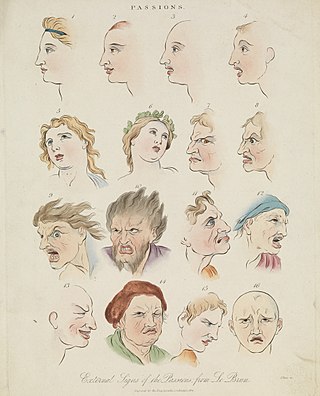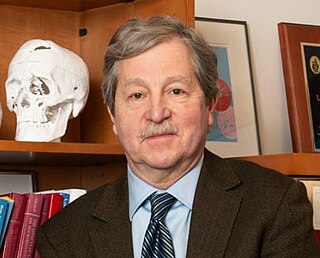
Emotions are mental states brought on by neurophysiological changes, variously associated with thoughts, feelings, behavioral responses, and a degree of pleasure or displeasure. There is no scientific consensus on a definition. Emotions are often intertwined with mood, temperament, personality, disposition, or creativity.

Cognitive neuroscience is the scientific field that is concerned with the study of the biological processes and aspects that underlie cognition, with a specific focus on the neural connections in the brain which are involved in mental processes. It addresses the questions of how cognitive activities are affected or controlled by neural circuits in the brain. Cognitive neuroscience is a branch of both neuroscience and psychology, overlapping with disciplines such as behavioral neuroscience, cognitive psychology, physiological psychology and affective neuroscience. Cognitive neuroscience relies upon theories in cognitive science coupled with evidence from neurobiology, and computational modeling.

Owen Flanagan is the James B. Duke University Professor Emeritus of Philosophy and Professor of Neurobiology Emeritus at Duke University. Flanagan has done work in philosophy of mind, philosophy of psychology, philosophy of social science, ethics, contemporary ethical theory, moral psychology, as well as on cross-cultural philosophy.

Antonio Damasio is a Portuguese-American neuroscientist. He is currently the David Dornsife Chair in Neuroscience, as well as Professor of Psychology, Philosophy, and Neurology, at the University of Southern California, and, additionally, an adjunct professor at the Salk Institute. He was previously the chair of neurology at the University of Iowa for 20 years. Damasio heads the Brain and Creativity Institute, and has authored several books: his work, Self Comes to Mind: Constructing the Conscious Brain (2010), explores the relationship between the brain and consciousness. Damasio's research in neuroscience has shown that emotions play a central role in social cognition and decision-making.
The cognitive revolution was an intellectual movement that began in the 1950s as an interdisciplinary study of the mind and its processes. It later became known collectively as cognitive science. The relevant areas of interchange were between the fields of psychology, linguistics, computer science, anthropology, neuroscience, and philosophy. The approaches used were developed within the then-nascent fields of artificial intelligence, computer science, and neuroscience. In the 1960s, the Harvard Center for Cognitive Studies and the Center for Human Information Processing at the University of California, San Diego were influential in developing the academic study of cognitive science. By the early 1970s, the cognitive movement had surpassed behaviorism as a psychological paradigm. Furthermore, by the early 1980s the cognitive approach had become the dominant line of research inquiry across most branches in the field of psychology.
Michael S. Gazzaniga is a professor of psychology at the University of California, Santa Barbara in the USA, where he heads the new SAGE Center for the Study of the Mind. He is one of the leading researchers in cognitive neuroscience, the study of the neural basis of mind. He is a member of the American Academy of Arts & Sciences, the Institute of Medicine, and the National Academy of Sciences.

Affective neuroscience is the study of how the brain processes emotions. This field combines neuroscience with the psychological study of personality, emotion, and mood. The basis of emotions and what emotions are remains an issue of debate within the field of affective neuroscience.

Affective science is the scientific study of emotion or affect. This includes the study of emotion elicitation, emotional experience and the recognition of emotions in others. Of particular relevance are the nature of feeling, mood, emotionally-driven behaviour, decision-making, attention and self-regulation, as well as the underlying physiology and neuroscience of the emotions.

Lisa Feldman Barrett is a University Distinguished Professor of psychology at Northeastern University, where she focuses on affective science. She is a director of the Interdisciplinary Affective Science Laboratory. Along with James Russell, she is the founding editor-in-chief of the journal Emotion Review. Along with James Gross, she founded the Society for Affective Science.

Buddhism includes an analysis of human psychology, emotion, cognition, behavior and motivation along with therapeutic practices. Buddhist psychology is embedded within the greater Buddhist ethical and philosophical system, and its psychological terminology is colored by ethical overtones. Buddhist psychology has two therapeutic goals: the healthy and virtuous life of a householder and the ultimate goal of nirvana, the total cessation of dissatisfaction and suffering (dukkha).
Klaus Rainer Scherer is former Professor of Psychology and director of the Swiss Center for Affective Sciences in Geneva. He is a specialist in the psychology of emotion. He is known for editing the Handbook of Affective Sciences and several other influential articles on emotions, expression, personality and music.

John Terrence Cacioppo was the Tiffany and Margaret Blake Distinguished Service Professor at the University of Chicago. He founded the University of Chicago Center for Cognitive and Social Neuroscience and was the director of the Arete Initiative of the Office of the Vice President for Research and National Laboratories at the University of Chicago. He co-founded the field of social neuroscience and was member of the department of psychology, department of psychiatry and behavioral neuroscience, and the college until his death in March 2018.

Jaak Panksepp was an Estonian-American neuroscientist and psychobiologist who coined the term "affective neuroscience", the name for the field that studies the neural mechanisms of emotion. He was the Baily Endowed Chair of Animal Well-Being Science for the Department of Veterinary and Comparative Anatomy, Pharmacology, and Physiology at Washington State University's College of Veterinary Medicine, and Emeritus Professor of the Department of Psychology at Bowling Green State University. He was known in the popular press for his research on laughter in non-human animals.
Beatrice M. L. de Gelder is a cognitive neuroscientist and neuropsychologist. She is professor of Cognitive Neuroscience and director of the Cognitive and Affective Neuroscience Laboratory at the Tilburg University (Netherlands), and was senior scientist at the Martinos Center for Biomedical Imaging, Harvard Medical School, Boston (USA). She joined the Department of Cognitive Neuroscince at Maastricht University in 2012. Her research interests include behavioral and neural emotion processing from facial and bodily expressions, multisensory perception and interaction between auditory and visual processes, and nonconscious perception in neurological patients. She is author of books and publications. She was a Fellow of the Netherlands Institute for Advanced Study, and an elected member of the International Neuropsychological Symposia since 1999. She is currently the editor-in-chief of the journal Frontiers in Emotion Science and associate editor for Frontiers in Perception Science.
David Amodio is an American scientist who examines the psychological and neural mechanisms underlying social behavior, with a focus on self-regulation and intergroup relations. Amodio is known for his role in developing the field of social neuroscience and for his neuroscientific approach to social psychology.

Charles A. Nelson III is an American neuroscientist and psychologist. His international projects include a long-standing project on institutionalized children in Romania, children growing up in a slum in Dhaka, Bangladesh, infants in Puerto Rico exposed to the Zika virus, and children growing up in challenging circumstances in Sao Paulo, Brazil. Dr. Nelson has also focused his research efforts on the development of memory and the ability to recognize facial expressions of emotion in infants and young children. Recently, Nelson was recognized for his on-going research with infants and children at high risk for developing autism spectrum disorder.
Elizabeth Anya Phelps is the Pershing Square Professor of Human Neuroscience at Harvard University in the Department of Psychology. She is a cognitive neuroscientist known for her research at the intersection of memory, learning, and emotion. She was the recipient of the Social and Affective Neuroscience Society Distinguished Scholar Award and the 21st Century Scientist Award from the James S. McDonnell Foundation, as well as other honors and awards in her field. Phelps was honored with the 2018 Thomas William Salmon Lecture and Medal in Psychiatry at the New York Academy of Medicine. She received the 2019 William James Fellow Award from the Association for Psychological Science (APS) which acknowledged how her "multidisciplinary body of research has probed the influence of emotion across cognitive and behavioral domains using novel imaging techniques and neuropsychological studies grounded in animal models of learning."
Elizabeth Kensinger is Professor of Psychology and Neuroscience at Boston College. She is known for her research on emotion and memory over the human lifespan. She is co-author of the book Why We Forget and How To Remember Better: The Science Behind Memory, published in 2023 by Oxford University Press, which provides an overview of the psychology and neuroscience of memory. She also is the author of the book Emotional Memory Across the Adult Lifespan, which describes the selectivity of memory, i.e., how events infused with personal significance and emotion are much more memorable than nonemotional events. This book provides an overview of research on the cognitive and neural mechanisms underlying the formation and retrieval of emotional memories. Kensinger is co-author of a third book How Does Emotion Affect Attention and Memory? Attentional Capture, Tunnel Memory, and the Implications for Posttraumatic Stress Disorder with Katherine Mickley Steinmetz, which highlights the roles of emotion in determining what people pay attention to and later remember.
Cognition and Emotion is a peer-reviewed scientific journal with a specific focus on the interplay between thinking and feeling, or cognition and emotion. Within Western thought, cognition and emotion have traditionally been conceived as adversaries. However, it is also possible to understand emotion within a cognitive framework, or to treat cognition and emotion as integrated neural networks. These and other perspectives on the relation between cognition and emotion are studied and debated within the pages of Cognition & Emotion. Cognition and Emotion has an interdisciplinary orientation and publishes contributions from cognitive psychology, social psychology, personality psychology, developmental psychology, psychophysiology, and cognitive neuroscience.
Kristen A. Lindquist is a psychologist and affective neuroscientist whose research focuses on language, emotions, and culture. Lindquist is known for her work on emotion words, suggesting that when speakers of different languages talk about common emotions like love, they may not mean the same thing. Her findings run counter to the view that there are universal emotions that are experienced the same across cultures. Lindquist is Associate Professor of Psychology and Neuroscience and Director of Carolina Affective Science Lab at the University of North Carolina, Chapel Hill.








